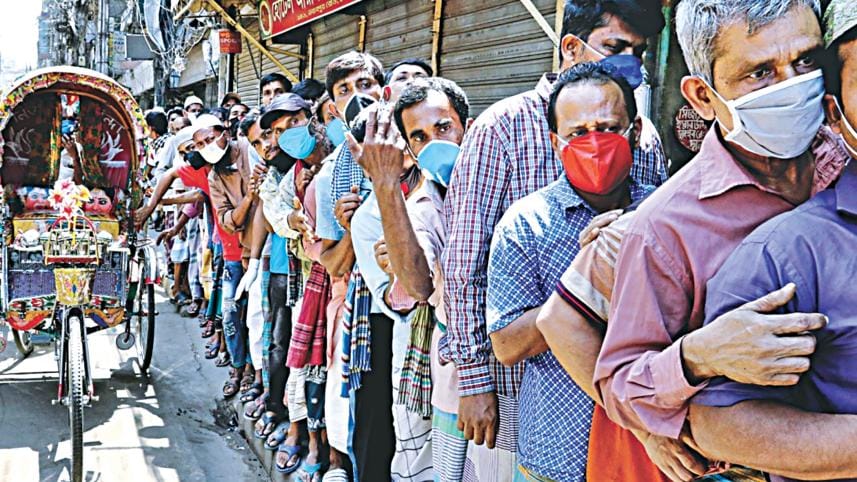COVID-19 dilemma: lives or livelihood?

'Lives or livelihood?' is the conflict haunting nations worldwide and Bangladesh is no exception. Whether to impose stricter restrictions to contain the virus or to relax such measures to earn livelihood has become the prime dilemma in the combat against the novel coronavirus.
Unlike previous months, Bangladesh is now experiencing a steeper rise in COVID-19 cases. The number of new infections has increased by more than 10,000 in less than two weeks. Although the country reported a total of 298 deaths related to COVID-19, the actual number would be higher as all suspected patients were not tested due to limited capacity.
Pertinent to what is seen in other countries and considering the highly-dense population of Bangladesh, the situation is more likely to continue worsening throughout. Besides, there is the possibility of a potential resurgence (second wave) after Bangladesh has contained the first outbreak.
Waiting for the so-called 'herd immunity' to stop the virus can also come up only with the worst possible consequences. On the contrary, even if a highly effective vaccine has been discovered, it is very unlikely to be widely available in Bangladesh within a year.
As such, once the unthinkable has now become obvious – we have to deal with the novel coronavirus for a considerable time and that not without the economy swirling. Hence, millions of families, who rely on daily wages, are being pushed to the edges for survival and this harsh reality necessitates the partial reopening of the economy. But, how do we ensure that an undue haste will not risk waves of infection and even a deeper economic crisis?
Although the educational institutions are closed and general holidays have already been extended, we have seen the reopening of the garment factories and shopping malls earlier this month. This decision of partial reopening came at a crucial time when the daily case counts are spurting and so are the deaths.
This notion strikingly differs from most other countries as they started lifting restrictive measures only after observing a stable decline in the daily counts. The more we lift our layers of protection, the more risk we invite towards seeing a surge.
Therefore, partial reopening must not be a random or date-driven decision. Instead, it should be based upon how the situation evolves, endorsed by well-formulated strategic analysis and scientific evidence with the daily case counts as an essential guidepost.
The following criteria may be proposed to inform the decision to either relax or strengthen the social restrictions:
Declining cases: Stable downward trajectory of daily case counts be observed.
Testing and contact tracing: Capacity to conduct adequate tests and contact tracing of patients be ensured.
Enhancing health system capacity: Protective measures for front liners, adequate supply of personal protective equipment and enhanced capacity of hospitals and isolation units to accommodate infected patients after any possible potential surge be secured.
Planning and strict monitoring: Well-developed guidelines to protect the health and safety of the workers and strict monitoring for compliance be guaranteed.
Relaxing mitigation strategies (such as lockdown and school closures) in absence of the above measures would jeopardise the entire system, sparking an even deadlier outbreak.
This virus is going to stay here for a while and the worst is yet to expect. The government needs to be prepared to reimpose lockdown measures, if necessary.
We must remember, if the quest to open up the businesses significantly increases the health risks, businesses will suffer the most in the long run. If not properly planned and executed, rushing towards the normal can only make our wait for the normal even longer.
Dr Shahriar Rozen is a public health professional, currently working as a Senior Policy Lead for Alberta Ministry of Health, Canada.
Email: rozen@ualberta.ca
Muhammad Rizwanur Rahman is a doctoral student at the Department of Mechanical Engineering, University of Alberta, Canada. Email: mrizwanur@ualberta.ca



 For all latest news, follow The Daily Star's Google News channel.
For all latest news, follow The Daily Star's Google News channel.
Comments